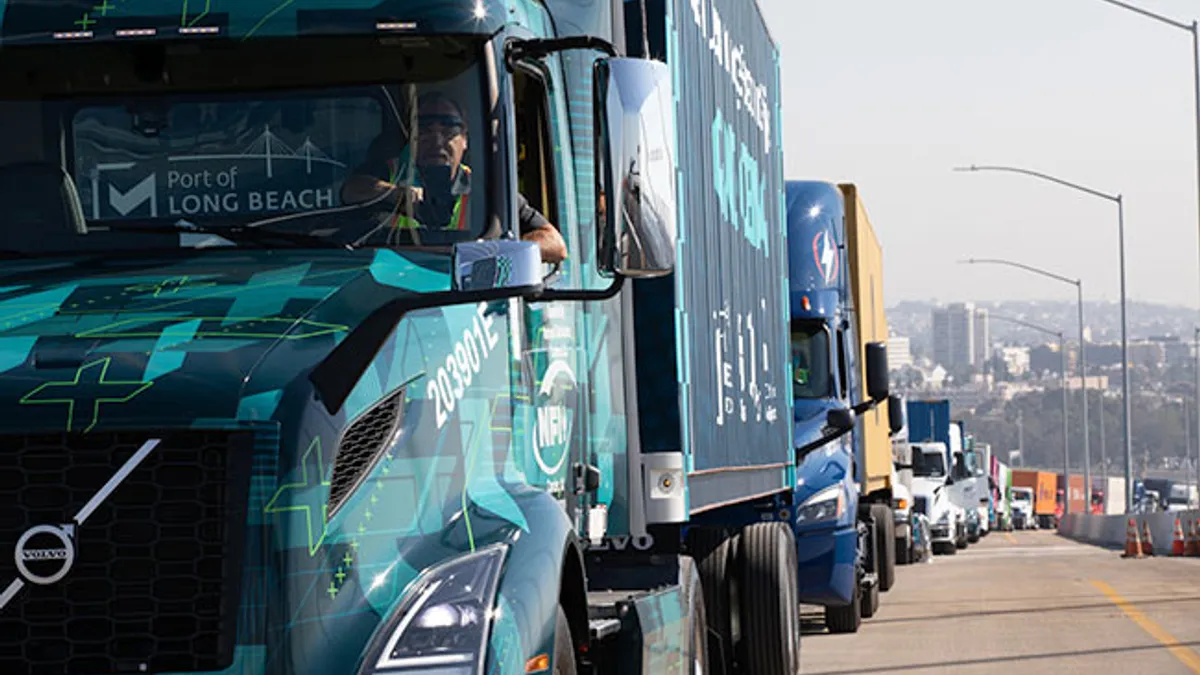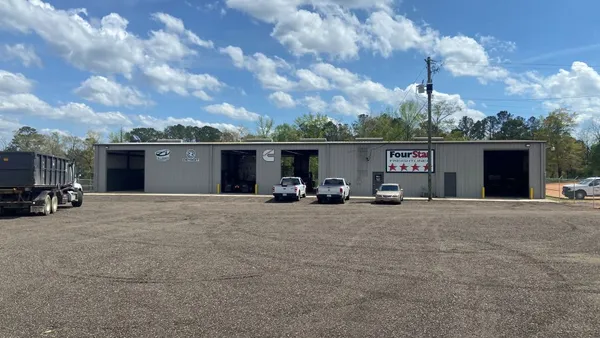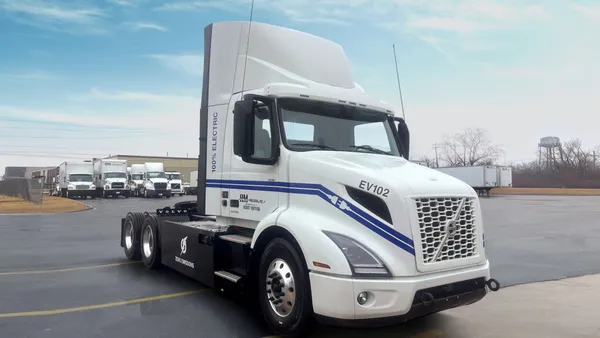Dive Brief:
- Volvo Trucks North America is set to deploy 70 Class 8 VNR Electric trucks in Southern California for regional freight distribution and drayage, the company announced Monday. Fleets will receive the trucks starting in 2021 and will be able to operate them for at least a year, according to Volvo. The program ends in Q3 2022.
- These deployments will be funded by a $20 million grant from the Environmental Protection Agency's Targeted Air Shed Grant Program and a $1.7 million grant from the South Coast Air Quality Management District for charging infrastructure, according to the announcement. "Each customer site will be evaluated for the needed charging infrastructure – either using existing or additional charging stations," Brett Pope, director of electric vehicles at Volvo Trucks North America, said in an emailed statement.
- Volvo plans to gather deployment data "to further refine total cost of ownership calculations," according to the news release. The OEM said it also plans to use that data "to fine-tune production" of the truck model at its New River Valley, Virginia, plant. The VNR Electric's official commercial launch is slated to occur before the end of the year.
Dive Insight:
There are several basic questions fleets must answer when doing the math to justify the purchase of an electric truck. They might include how many miles the truck will be expected to drive, and how much dwell time would be required for charging, according to Mike Roeth, executive director of the North American Council for Freight Efficiency.
"Once you have the data, talk to the truck manufacturers to see if they have the trucks that match your needs," he told Transport Dive recently.
So, to sell an electric truck, OEMs must be familiar with how their equipment operates in day-to-day operations. Instead of nationwide tests, though, some OEMs are focusing on California, where governmental pressure to lower trucking emissions is most prevalent. They will eventually need to stop selling diesel trucks in California, due to regulations, and fleets in the state will likely be some of the first in the nation to purchase them at scale.
Volvo's main electric truck program in the Golden State is its Low Impact Green Heavy Transport Solutions project, known as Volvo LIGHTS, which is a collaboration with South Coast AQMD and 13 other entities. The group aims to develop an "end-to-end blueprint" on how to deploy battery-electric trucks and equipment at scale, according to Volvo. The OEM has deployed 25 trucks through Volvo LIGHTS.
"Volvo Trucks North America has stated the importance of public-private partnerships to advance new technologies during the start-up phase. Our experience working with multiple partnerships closes the gap for one-stop integration with our customers," Pope said.
The OEM said it plans to apply best practices learned from LIGHTS to its new deployment program. Volvo touted that, through the two programs, it is committed to delivering nearly 100 VNR Electric trucks to the region.
The first VNR Electric deployment, announced in June, was a pilot with TEC Equipment, a Volvo Trucks North America dealership in Fontana, California. Dependable Highway Express received two VNR Electric models in September, and NFI began piloting two shortly after.
Fleets in Southern California will be able to lease the VNR Electric from TEC Equipment, starting in 2021.
Under the grants, the 70 VNR Electric trucks will be deployed with fleets within the South Coast AQMD's jurisdiction, which includes cities in Los Angeles, Orange, Riverside and San Bernardino counties. The EPA grant focuses on regions with the highest ozone and particular matter pollution, Volvo said.
Participating fleets "will be operating the trucks in normal business operations, not pilot programs or R&D/testing," Pope said, though the OEM is not naming those fleets at this time.
Volvo is not yet giving a production timeline for the VNR Electric. But other manufacturers are aiming to roll trucks off the line in the near future.
Kenworth recently unveiled its first battery-electric Class 8 model, the Kenworth T680E, which will enter into production in 2021. And Nikola, which insists its manufacturing plans are on track in the wake of founder Trevor Milton's departure, said it will begin testing prototypes of its hydrogen fuel-cell powered semi-trucks by the end of 2021. Five prototypes of the Nikola Tre, a battery-electric truck, are slated to be tested in Germany and available to customers starting in Q4 2021.












